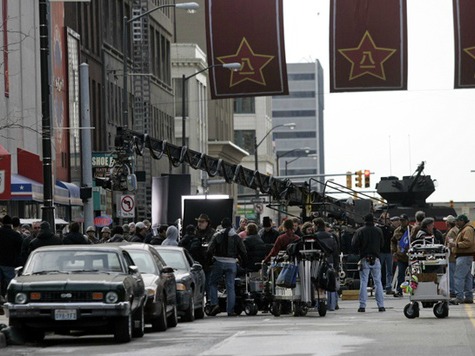In the ongoing effort to recover jobs and production business in California a recent Los Angeles City Hall Meeting was held, with members of Mayor Eric Garcetti’s Film Czar Office in attendance to discuss recommendations.
However during the panel local business owners were mentioned as one problem, with their requests for compensation during film shoots described as “extortion.”
This is a confrontational stance to take at a time when studios and area governments are vying to find ways to facilitate shooting in the area. Speaking to the commissioners Motion Picture and Television Production Deputy Rajiv Dalal tabled a number of issues and possible solutions for production challenges. However when he arrived on the subject of local business owners who have film productions taking place in front of, or in the vicinity of, their shops he brought up an aggressive position.
“Los Angeles is known as the extortion capital of the world for the film industry,” Dalal said in direct reference to area businesses looking for financial compensation to allow film projects to take place in their area. This is a myopic viewpoint, one seen strictly from the perspective of the studios, but the problem is Dalal is in fact working out of the office of the Mayor. They are supposed to be representing the citizenry and businesses of the community, not acting as a lobbyist on behalf of the studios.
Further, the practice of financial payouts to businesses in locations where productions are being staged is not something done as crony practice. These are in fact compensatory payments made on behalf of the loss of commerce. When a film set is erected a wide staging area is commonly cordoned off, and frequently city blocks are shut down to control the shooting environment. The impact of these sets on the businesses in the immediate area is often negative. Clientele has difficulty accessing the location and foot traffic is prevented.
And despite Dalal’s classification of this being an L.A. practice, the disruption of commerce is commonplace wherever filming takes place.
Case in point this past winter in Boston the negative impact of a film shoot on small businesses was felt during a John Travolta movie staged on a city block. In L.A., where disruptions may become more commonplace, these payments become more necessary.
And in a possible sign of the Mayor’s Film office looking at this issue primarily from a perspective of the studios, the deputy Czar actually was pushing for more permissions to be granted to location productions, to the further detriment of area business. In the recording from the meeting Dalal can be heard bringing up another idea. He addresses the “holiday moratorium,” where filming is prevented from taking place in metropolitan locales between Thanksgiving to New Years. This is to protect merchants from having business impacted during the busiest revenue period of the year. The Deputy Czar proposed a change in this policy (approximately 15:45)
For the production companies it (the holidays) is also a very important time for them. Perhaps we should look at ways of maybe pushing for one or two days to allow for filming … per week.
Dalal immediately segues to his classification of the compensatory payments as “extortion,” just as he proposes further impacting merchants’ commerce. The Mayor’s Film office appears to miss the point on this issue in two ways; business payouts make up for the loss of revenues, but they also facilitate in the granting of permission for film production to take place in these areas. If the compensations are not made the businesses are likely to block the efforts to come into an area and/or permits may not be granted as easily. Resistance to a production coming into an area is not only more likely but is already a common response.
Also attending the hearing was Tim Hillman, an L.A. location manager. Hillman agreed with Dalal’s interpretation of local shakedown, detailing how he has encountered many instances of area businesses working to disrupt a film production. Often loud music has been played, for example, in order to inspire the film company to pay in order for the music to be shut off. There is no small irony in a film company getting upset when another business interferes with its activities.
In a time where studios are lobbying the State of California for extremely generous tax breaks, all in the name of preserving entertainment jobs, it sounds tone deaf for a governmental office to label small business owners as practicing extortion. Moreover, being openly hostile to groups which could prevent productions from coming in also seems counterproductive to the cause.

COMMENTS
Please let us know if you're having issues with commenting.